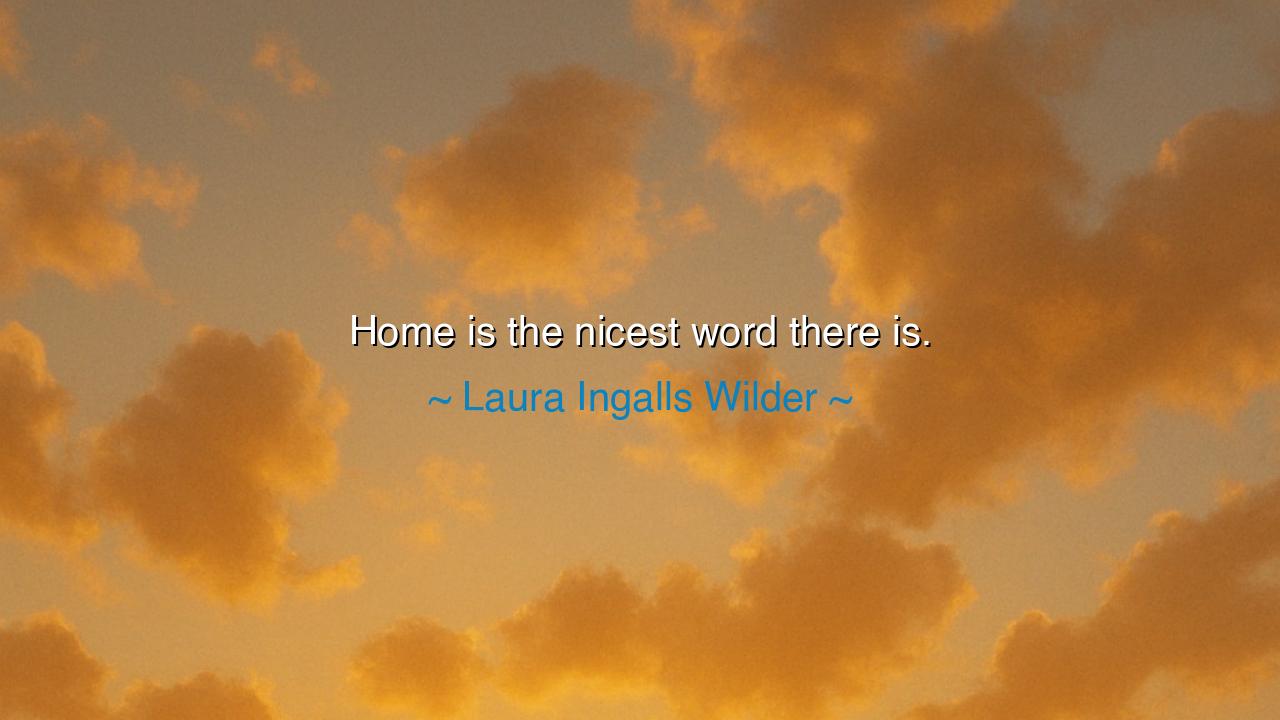
Home is the nicest word there is.






“Home is the nicest word there is.” Thus spoke Laura Ingalls Wilder, the gentle chronicler of frontier life and one of the great storytellers of the American spirit. In this simple and luminous phrase, Wilder captures the deepest longing of the human heart: the yearning for home—that sacred place where one finds peace, safety, and belonging. Few words carry such quiet power, for “home” is not only a location but a feeling, not merely a shelter but a sanctuary of the soul.
The origin of this saying comes from the tender reflections of Wilder’s own life. Born in 1867, she lived through the hardships and hopes of a pioneering age—wandering with her family from cabin to cabin, prairie to prairie, building and rebuilding their world with bare hands and steadfast hearts. Through hunger, storms, and uncertainty, she learned that “home” was not defined by permanence or comfort, but by the love that filled its walls. To her, home was wherever the Ingalls family gathered around a fire, wherever laughter broke the silence of the wilderness. Hence she wrote, with the wisdom of experience, that home—in all its simplicity—is the sweetest word a tongue can speak.
When Wilder said that home is “the nicest word,” she was not merely describing the beauty of a physical dwelling. She was touching the eternal truth that home is where the spirit rests. The word itself carries warmth, as if it were made of firelight and memory. It speaks of safety from the storm, of arms that hold without judgment, of a place where one can lay down the burden of the day. To the weary traveler, the soldier, the exile, the wanderer—it is the word that rekindles hope. It is the dream at the end of every journey.
History itself offers many who lived and died by the meaning of this word. Consider Odysseus, the hero of Homer’s epic, who roamed the seas for twenty years through war, temptation, and peril. Though he saw kingdoms and pleasures beyond imagining, his heart never ceased to ache for Ithaca—for his hearth, his wife, his son. All his glories were ashes beside the word home. When at last he returned, scarred and aged, he found that this single word was worth every trial. Wilder’s phrase echoes that same eternal truth: home is not measured in wealth or distance, but in love and belonging.
Yet Laura Ingalls Wilder also understood that home is fragile. It must be built and rebuilt in every generation, not only with wood and stone but with patience, kindness, and memory. She wrote of families who carved homes from wilderness, teaching that love itself is an act of construction. The “nicest word” is not given—it is created, day by day, through care, forgiveness, and the courage to stay when the winds howl. To have a home, one must first become at home in one’s own heart.
There is also a lesson in humility here. In an age of ceaseless motion, when many seek fulfillment in possessions or fame, Wilder’s words remind us that the truest treasures are those we return to. A humble cabin can be richer than a palace if peace dwells within. Home is the great equalizer, for both king and beggar long for the same thing—to be known, to be safe, to be loved. The wise therefore seek not the grandest house, but the warmest hearth.
The lesson, then, is clear: guard your home, and cherish those who dwell within it. Speak gently to one another, for every kind word strengthens its walls. Let gratitude dwell where complaint might rise. Remember that to say “home” is to name something holy—the meeting of love and memory, the place where life finds its meaning.
So, O listener, remember the wisdom of Laura Ingalls Wilder: home is indeed the nicest word there is—not because of what it contains, but because of what it represents. Wherever love abides, wherever hearts gather and forgive, wherever laughter endures, there—no matter how small or simple—home is found. And in finding it, one discovers the heart’s own peace, the quiet joy that even time cannot take away.






AAdministratorAdministrator
Welcome, honored guests. Please leave a comment, we will respond soon